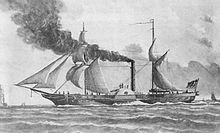Battle of Heligoland (1849)
| Battle of Heligoland | |||||||
|---|---|---|---|---|---|---|---|
| Part of theFirst War of Schleswig | |||||||
 Gefecht bei Helgoland,unknown author | |||||||
| |||||||
| Belligerents | |||||||
|
|
| ||||||
| Commanders and leaders | |||||||
|
|
| ||||||
| Strength | |||||||
|
1 sail corvette 1 steamer |
1 steam frigate 2 steam corvettes | ||||||
| Casualties and losses | |||||||
| None | None | ||||||
The firstBattle of Heligolandtook place on 4 June 1849 during theFirst Schleswig Warand pitted the fledglingReichsflotte(Imperial Fleet) against theRoyal Danish Navy,which had blocked German naval trade inNorth SeaandBaltic Seasince early 1848. The outcome was inconclusive, with no casualties, and the blockade went on. It remained the only battle of the German fleet.[1][2]
Battle
[edit]




At the outbreak of the First Schleswig War, the Danes instituted ablockade,stopping all German trade in theNorth Seaand theBaltic Sea.This prompted the German parliament at Frankfurt to form a new all-German navy. The Germans had to build a fleet from scratch, buying ships abroad and converting them, and hiring foreign officers (British, Belgian) to lead native veteran merchant mariners.[3]
After about a year of preparation, on 4 June, German AdmiralKarl Rudolf BrommyleftBremerhavenwith the steam frigateSMSBarbarossaand the smaller steam corvettesLübeck (1844)andHamburg (1841)in order to disperse the Danish ships which were guarding the mouth ofWeser River.The Danish forces present that day were inferior and retreated, but Brommy managed to cut off[3]the sailing corvetteValkyrienwhich under captain Andreas Polder sought refuge near the island ofHeligolandwhich at the time belonged to theUnited Kingdom.The British, while being neutral, had made clear beforehand that a German Navy was not welcome and might be treated as pirates.
Ships of both sides fired some shots, with no effect. When the German approached the island's three-mile zone, the British forces fired warning shots towards them, while allowing the Danish corvette to stay close. Brommy, not willing to draw theRoyal Navyinto the war, stayed at a distance while the Danish captain Polder was waiting for the arrival of reinforcements from the Danish main fleet. When the modern steamerGejser,underKaptajnløjtnant(captain lieutenant)Jørgen Peter Frederik Wulff,came into sight, Brommy retreated, fearing further Danish reinforcements. The Danes followed the Germans to the mouth of theElbenearCuxhavenbefore resuming the blockade.
It was the first and the last excursion of the small fleet under the black-red-goldFlag of Germany.
See also
[edit]Notes
[edit]- ^Im Juni 1849 kam es bei Helgoland zum einzigen Gefecht der, trotz des großen materiellen Aufwandes, niemals voll einsatzfähigen Bundesflotte gegen dänische Schiffe.-Deutsche Marine, History
- ^die erste und einzige Seefahrt unter der Schwarz-rot-goldnen Flagge– Georg Wislicenus,Deutschlands Seemacht[1]
- ^abLawrence Sondhaus,Naval Warfare, 1815–1914p. 49
Literature
[edit]- Guntram Schulze-Wegener:Deutschland zur See. 150 Jahre Marinegeschichte.Mittler, Hamburg 1998.ISBN3-8132-0551-7
- Jörg Duppler:Germania auf dem Meere / Bilder und Dokumente zur Deutschen Marinegeschichte 1848 –1998.Mittler, Hamburg 1998.ISBN3-8132-0564-9
- Giese, Fritz: Kleine Geschichte der deutschen Flotte
- Hansen, Hans Jürgen: Die Schiffe der deutschen Flotten 1848–1945
- Hildebrand, Hans H. / Henriot, Ernest:: Deutschlands Admirale 1849–1945
- Kroschel, Günter / Evers, August-Ludwig: Die deutsche Flotte 1848–1945
- Rhades, Dr. Jürgen: Die deutsche Marine in Vergangenheit und Gegenwart
- Röhr, Albert: Deutsche Marinechronik
- Witthöft, Hans Jürgen: Lexikon zur deutschen Marinegeschichte
- Georg Wislicenus:Deutschlands Seemacht,Published 2007 Reprint-Verlag-Leipzig, 206 pages,ISBN3-8262-2313-6[2]
- Lawrence Sondhaus:Naval Warfare, 1815–1914,Published 2001, Routledge, 272 pages,ISBN978-0-415-21478-0
External links
[edit]- Deutsche Marine, History(in German)
- Überblick über die Reichsflotte(in German)
